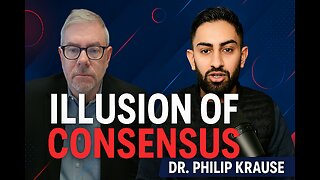Premium Only Content

TIKTOK
Black magic, also known as dark magic, is a term used to describe supernatural practices that are intended to cause harm, manipulate, or exert control over others. It is often associated with negative or malevolent intentions.
Here are some key points about black magic:
Intentions: Black magic is typically performed with the intention of causing harm, suffering, or misfortune to a specific person or group of people.
Practices: Practices associated with black magic can include rituals, spells, curses, and incantations. These may involve the use of specific objects, symbols, or substances.
Cultural Variations: Beliefs and practices related to black magic vary significantly across cultures and regions. What is considered black magic in one culture might be perceived differently in another.
Ethical and Moral Considerations: Black magic is often viewed as unethical and morally wrong in many cultures and belief systems. It is often condemned and discouraged.
Protection and Countermeasures: Some cultures and belief systems have practices or rituals aimed at protecting individuals from the effects of black magic. These are often referred to as protective or counter-magic.
Psychological Impact: Belief in black magic can have a psychological impact on individuals. The fear of being targeted by black magic can lead to stress and anxiety.
Legal Implications: In some places, certain forms of black magic may be considered illegal, particularly if they involve coercion, harassment, or harm to others.
It's important to note that beliefs and practices related to black magic are highly subjective and can vary greatly based on cultural, religious, and individual perspectives. While some people genuinely believe in the power of black magic, others may view it as superstition or folklore.
If you are concerned about black magic or believe you have been affected by it, it's important to seek advice and support from trusted religious or spiritual leaders, mental health professionals, or local authorities who are equipped to address such concerns within your specific cultural and legal context.
-
 11:29
11:29
Tundra Tactical
1 hour ago $0.38 earnedGEN Z Brit 3D Prints a WORKING Gun Pt.3!
5.26K2 -
 2:08:21
2:08:21
The Illusion of Consensus
9 days agoFormer FDA Official Dr. Philip Krause On White House Pressure To Approve Covid Vaccines at the FDA
36.3K33 -
 4:25:56
4:25:56
GamerGril
6 hours agoFistful of GrilCheese 🤠 How The West Was Won 🤠
14.2K -
 LIVE
LIVE
Akagumo
11 hours ago🔴 LIVE - AKAGUMO - SPECTACULAR SATURDAY! #12 - WARZONE VERDANSK RETURNS
70 watching -
 1:50:26
1:50:26
Darkhorse Podcast
8 hours agoThere’s a New Tariff In Town: The 271st Evolutionary Lens with Bret Weinstein and Heather Heying
40.3K37 -
 29:36
29:36
The Brett Cooper Show
2 days ago $4.45 earnedThe Non-Binary Samurai Game No One Wanted | Episode 19
40.3K39 -
 LIVE
LIVE
Phyxicx
5 hours agoHalo on a Saturday! - 4/5/2025
101 watching -
 16:46
16:46
Stephen Gardner
9 hours agoJudge Boasberg THREATENS to ARREST Trump White House leaders!
47.6K228 -
 1:30:53
1:30:53
Michael Franzese
1 day agoMichael Franzese UNLEASHES on the Left: Lies, Fraud, and Betrayal
40.1K43 -
 6:15
6:15
SKAP ATTACK
1 day ago $3.10 earnedGiannis Goes Full FREAK MODE in Historic Game
37.8K2